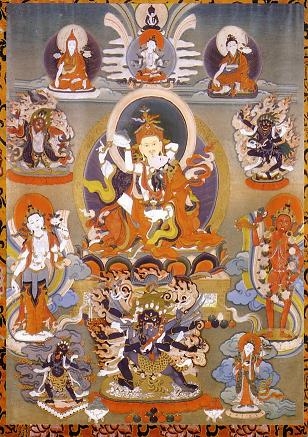Longchen Nyingtik: Difference between revisions
No edit summary |
|||
| Line 103: | Line 103: | ||
:*[[Sogyal Rinpoche]] | :*[[Sogyal Rinpoche]] | ||
:*[[Khangsar Tenpé Wangchuk]] | :*[[Khangsar Tenpé Wangchuk]] | ||
:*[[Alak Zenkar Rinpoche]] | :*[[Alak Zenkar Rinpoche]] | ||
:*[[Pema Wangyal Rinpoche]] | :*[[Pema Wangyal Rinpoche]] | ||
| Line 111: | Line 109: | ||
:*[[Dzogchen Rinpoche|Dzogchen Rinpoche VII]] | :*[[Dzogchen Rinpoche|Dzogchen Rinpoche VII]] | ||
:*[[Shechen Rabjam Rinpoche]] | :*[[Shechen Rabjam Rinpoche]] | ||
:*[[Khenpo Chöga]] | |||
==Further Reading== | ==Further Reading== | ||
Revision as of 11:09, 5 December 2007

Longchen Nyingtik [Tib.] - a Nyingma cycle of teachings and practice, which was discovered by Jikmé Lingpa through a series of visions from the great 14th century master, Longchenpa.
The Revelation of Longchen Nyingtik
Although separated in time by some four centuries, Jikmé Lingpa was tremendously inspired by the teachings of Longchenpa, and during a three-year retreat in the caves of Chimphu between 1759–62, he invoked him fervently with a Guru Yoga he had composed. Longchenpa appeared to him in three visions, through which he received the blessing and transmission of the wisdom body, speech and mind of Longchenpa, empowering him with the responsibility of preserving the meaning of the teachings of Longchenpa, and of spreading them. Longchenpa appeared to him three times: first he appeared as quite old, the second time he appeared he was younger and smiled at him, and the third time he was very youthful, came alive, took the whole teaching in the form of a book and placed it on his head, granting him the Rigpé Tsal Wang. At that instant his mind became one with the wisdom mind of Longchenpa.
The Stages of Practice
The Longchen Nyingtik cycle of teachings contains a complete Vajrayana path. The stages of the path are:
- Ngöndro, the preliminary practices. See Longchen Nyingtik Ngöndro
- The main practice, which consists of:
The Major Texts
The major texts of Longchen Nyingtik are as follows:
Original Tantras
- The root tantra: Kuntu Zangpo Yeshe Longki Gyü
- The subsequent tantra: Gyü Chima
- Teachings: Kuntu Zangpö Gong-nyam
- Instructions
- a. Instructions: Nesum Shenje and Neluk Dorje Tsigang
- b. Their commentaries: Yeshe Lama with its supporting texts
- a. Instructions: Nesum Shenje and Neluk Dorje Tsigang
Sadhanas
1. Male vidyadharas
- a. Peaceful: outer: Guru Yoga
- inner: Rigdzin Düpa
- secret: Dukngal Rangdrol
- innermost secret: Ladrup Tiklé Gyachen
- inner: Rigdzin Düpa
- b. Wrathful: blue: Palchen Düpa
- red: Takhyung Barwa
- red: Takhyung Barwa
2. Female vidyadharas
- a. Peaceful: root sadhana: Yumka Dechen Gyalmo
- b. Wrathful: secret sadhana: Senge Dongchen
Lineage of the Longchen Nyingtik
Some of the main lineage holders of the Longchen Nyingtik lineage are listed below.
First stage
- Samantabhadra, the Dharmakaya
- Vajrasattva, the Sambhogakaya
- Prahevajra (Tib. Garab Dorje), the Nirmanakaya; the first human master of Dzogpa Chenpo
- King Trisong Detsen, received Nyingtik teachings from Guru Rinpoche and Vimalimitra
- Yeshe Tsogyal
- Vairochana
- Longchen Rabjam
- Ridgzin Jigmé Lingpa, revealed the Longchen Nyingtik teachings
Later stages
- Dodrupchen I Jikmé Trinlé Özer, the direct disciple of Jigme Lingpa, he arranged and expanded on Jigme Lingpa’s revelation
- Jikmé Gyalwé Nyugu
- Dola Jikmé Kalzang
- Fourth Dzogchen Mingyur Namkhé Dorje
- Do Khyentse Yeshe Dorje
- Gyalsé Shenpen Tayé
- Dzogchen Khenpo Pema Dorje
- Patrul Jigme Chokyi Wangpo
Present day teachers
Further Reading
- Patrul Rinpoche, The Words of My Perfect Teacher, translated by the Padmakara Translation Group, Shambhala 1994, revised ed. 1998
- Tulku Thondup, Enlightened Journey, Boston & London, Shambhala, 1995
- Tulku Thondup, Masters of Meditation and Miracles, Shambhala, 1996